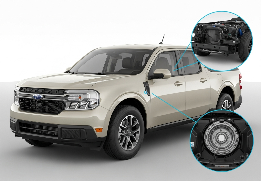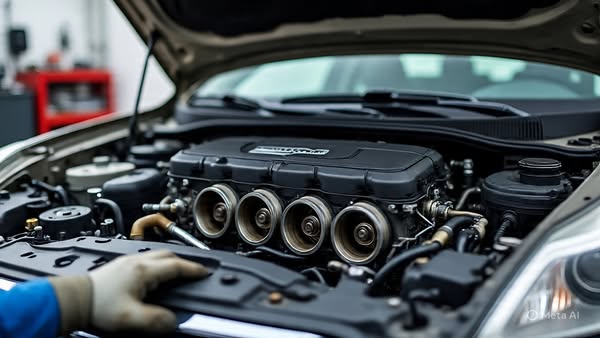
Ford Recalls Hundreds of Thousands of Maverick Pickup Trucks: What You Need to Know in 2025
Ford Recalls Hundreds of Thousands of Maverick Pickup Trucks When it comes to vehicle safety, even the biggest names in the auto industry are not immune to issues. Recently, Ford Recalls Hundreds of Thousands of Maverick Pickup Trucks, drawing national attention from consumers, safety advocates, and the automotive world alike. This isn’t just another minor recall—it affects a large number of owners and stems from a safety concern that could have real-world implications.
As an industry expert with over seven years of blogging and SEO experience, I’ve been following vehicle recall trends closely. In this in-depth article, I’ll break down the Ford Maverick recall: what triggered it, how it impacts drivers, what Ford is doing to respond, and how you can stay protected if you own one of these trucks. Let’s dive in.
What Triggered the Ford Maverick Recall?
The recall, officially announced in early July 2025, is tied to a critical issue with the Maverick’s battery and electrical system. According to Ford’s statement and documentation submitted to the National Highway Traffic Safety Administration (NHTSA), certain 2022–2024 Maverick pickup trucks may experience unintended power loss while driving.
This flaw originates from a software malfunction in the vehicle’s hybrid powertrain control module, which can cause the system to misinterpret the battery’s voltage state. In simple terms, the truck might suddenly think it has no power, even when the battery is fine. As a result, the vehicle can shut down unexpectedly—a clear hazard for drivers at highway speeds or in heavy traffic.
Ford estimates that approximately 456,000 Maverick trucks are affected globally, with over 390,000 in the U.S. alone. That number puts this among the more substantial recalls Ford has issued in recent years.
How Dangerous Is the Problem?
Any time a vehicle loses power without warning, there’s a major safety risk. Imagine cruising down the freeway at 65 mph and suddenly losing acceleration or electric assist—that could easily result in a rear-end collision or worse. It’s not just a mechanical inconvenience; it’s a real danger to drivers, passengers, and others on the road.
So far, Ford has reported at least 17 incidents that may be linked to the issue. Fortunately, no fatalities have been confirmed, but there have been a few minor injuries and several near-miss accidents. The company emphasized that it’s acting “out of an abundance of caution,” but NHTSA investigations suggest the issue warranted swift and wide-reaching action.
In comparison with other recent recalls, this one is considered medium to high risk, particularly because the defect doesn’t trigger a warning in many cases before the failure occurs. That unpredictability makes it even more pressing.
Which Models Are Affected?
Not all Maverick trucks are involved, but a substantial portion are. Here’s a quick overview:
| Model Year | Trim Levels Affected | Production Dates | Approx. Units Recalled |
|---|---|---|---|
| 2022 | XL, XLT, Lariat | June 2021 – Dec 2022 | 145,000+ |
| 2023 | XL, XLT, Lariat | Jan 2023 – Nov 2023 | 165,000+ |
| 2024 | Hybrid models only | Dec 2023 – June 2024 | 146,000+ |
All of the affected vehicles are hybrid variants, not the gas-only models. If you own a hybrid Maverick from these model years, it’s essential to check with your dealership or the official Ford website to confirm whether your VIN is on the recall list.
Ford’s Official Response and Recall Process
To Ford’s credit, the company has moved relatively quickly once the issue became apparent. After gathering data from internal diagnostics, field reports, and NHTSA feedback, Ford issued the recall voluntarily and began notifying registered owners by mail and email starting July 8, 2025.
Here’s what Ford is offering affected owners:
-
Free software update at certified dealerships.
-
Loaner vehicles for drivers who experience power loss prior to recall service.
-
Extended warranty coverage on the hybrid control module post-fix.
Ford is urging owners to schedule service appointments immediately, even if they haven’t experienced any symptoms yet. The fix only takes about one hour, according to dealership techs, and does not require any parts replacement—just a reflash of the hybrid control module.
How to Check If Your Truck Is Affected
Not sure whether your Maverick is included? Here are a few easy steps to check:
Step 1: Locate Your VIN
Your Vehicle Identification Number (VIN) is typically found on the lower corner of your windshield (driver’s side) or inside your driver-side door panel.
Step 2: Visit Ford’s Recall Site
Go to www.ford.com/support and enter your VIN in the recall lookup tool.
Step 3: Schedule Service
If your truck is part of the recall, use the site to schedule service with your nearest authorized dealership. Most shops are now prioritizing Maverick recall appointments.
Additionally, you can contact Ford Customer Service at 1-866-436-7332 for direct help.
What This Recall Says About the Industry
This incident highlights several broader themes that are currently playing out across the auto industry in 2025:
-
Software-related recalls are becoming more common. As more vehicles integrate complex electronic systems, software bugs—not just mechanical failures—are leading to recalls.
-
Hybrids and EVs bring new challenges. While the Maverick recall doesn’t involve a full EV, its hybrid nature makes it more susceptible to powertrain software issues that didn’t exist in older models.
-
Proactive manufacturer response is crucial. Ford’s quick acknowledgment and response are earning it cautious praise. Transparency and fast fixes help maintain trust with consumers.
This is not an isolated case. Tesla, Toyota, and Hyundai have all issued similar software-based recalls this year. As vehicles become more like “computers on wheels,” the industry is learning how to evolve its quality control systems accordingly.
How Owners Are Reacting
Across online forums and social media, Maverick owners have had mixed reactions. Many have praised Ford for its quick action and easy repair process, but others have expressed frustration over safety risks and limited dealership availability for scheduling appointments.
One user on Reddit’s r/FordMaverick community wrote:
“I love my truck, but losing power on a road trip in Tennessee nearly got us rear-ended. I’m just thankful it’s being fixed, but I expected better QA from Ford.”
Another echoed:
“Took it in yesterday, and the update only took 45 minutes. Props to Ford for fixing it fast, but I hope this doesn’t happen again.”
Customer sentiment seems to hinge largely on how fast Ford resolves the issue and whether follow-up problems appear.
What Should You Do If You’re Affected?
If you drive one of the affected Maverick trucks, here’s a quick checklist:
-
Check your VIN immediately.
-
Schedule a service appointment as soon as possible.
-
Drive cautiously in the meantime—avoid high-speed travel if your truck is exhibiting warning signs like blinking dashboard lights or sluggish acceleration.
-
Monitor news updates from Ford and NHTSA for any new developments.
Don’t ignore the issue, even if you haven’t had any problems yet. Vehicle recalls are not just a formality—they’re issued to prevent accidents and save lives.
Conclusion: A Recall Worth Taking Seriously
The news that Ford recalls hundreds of thousands of Maverick pickup trucks in 2025 should not be taken lightly. While the fix may be simple, the potential consequences of not addressing the issue are serious. Whether you’re a current Maverick owner or someone considering buying one, this situation is a reminder that vehicle technology—no matter how advanced—is never immune to error.
Ford’s response so far has been proactive and transparent. But it’s also a wake-up call for automakers to invest even more in quality assurance for software systems. As vehicles continue to evolve, both manufacturers and consumers need to stay educated, vigilant, and responsive.
FAQs
What’s going on with the Ford Maverick recall?
Ford has recalled over 450,000 Maverick hybrid trucks due to a software issue that can cause unexpected power loss while driving. The issue affects models from 2022 to 2024.
How do I know if my Maverick is part of the recall?
Check your VIN on Ford’s official recall page or call your dealership. Most affected trucks are hybrid models made between 2021 and mid-2024.
Is the fix free?
Yes, Ford is offering the software update completely free of charge. It takes less than an hour at most dealerships.
Can I keep driving my truck?
If your vehicle hasn’t experienced issues yet, you can likely drive it safely—but do so with caution and avoid long or high-speed trips until the fix is applied.
Is this the only recall Ford has issued in 2025?
No, Ford has issued a few smaller recalls this year as well, but this Maverick recall is the largest so far in 2025, and one of the most serious due to its safety implications.
Stay safe, stay informed, and get your vehicle checked. If you found this guide helpful, feel free to share it with other Maverick owners or anyone who might benefit from knowing the latest.




